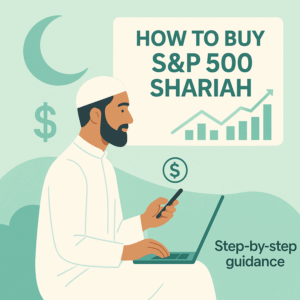Exploring how to invest in S&P 500 Shariah is an increasingly appealing subject to Muslim investors and ethical investors worldwide.
As interest in Islamic finance grows, the S&P 500 Shariah Index offers a practical solution, tracking the performance of Shariah-compliant companies within the broader S&P 500 Index.
This article explores how investors, particularly those outside the US, can participate in this halal investment option and what to consider along the way.
We’ll cover:
- How to invest in S&P 500 Shariah index outside US
- Can you invest in S&P 500 Shariah as a foreigner?
- How to buy S&P 500 Shariah for non-US investors
- Where to buy S&P 500 Shariah
- Is it safe to invest in S&P 500 Shariah index?
If you are looking to invest as an expat or high-net-worth individual, which is what I specialize in, you can email me (hello@adamfayed.com) or WhatsApp (+44-7393-450-837).
This includes if you are looking for a free expat portfolio review service to optimize your investments and identify growth prospects.
Some facts might change from the time of writing. Nothing written here is financial, legal, tax, or any kind of individual advice or a solicitation to invest.
But first, let’s get to know some important terms related to this investment opportunity. You can move on to the next section if these are already familiar to you.

Definition of Key Terms for Shariah-Compliant S&P 500 Investing
When exploring how to invest in the S&P 500 Shariah index, understanding the key terms is essential.
These definitions will help clarify how Shariah-compliant investing works and what differentiates it from conventional options.
S&P 500 Index
The S&P 500 Index is a market-cap-weighted index that tracks the performance of 500 of the largest publicly traded companies in the US.
It serves as a benchmark for the overall US stock market.
S&P 500 Shariah Index
This is a filtered version of the S&P 500 that only includes companies considered Shariah-compliant, meaning they meet specific Islamic criteria related to business activities and financial ratios.
Halal vs Haram Investments
- Halal investments (permissible) are aligned with Islamic principles. These exclude companies involved in alcohol, gambling, pork, conventional banking, interest-based finance, adult entertainment, and other non-permissible sectors.
- Haram investments (forbidden) include companies that engage in any of the activities above or fail to meet Shariah financial ratio screens.
The S&P 500 Shariah Index excludes haram companies to ensure the portfolio is halal.
Shariah-Compliant
An investment is Shariah-compliant if it adheres to Islamic guidelines. This includes:
- Exclusion of haram sectors
- Debt-to-asset and interest-income ratio screening
- Periodic review by a Shariah advisory board
Halal ETF
A halal ETF is an exchange-traded fund that tracks a portfolio of Shariah-compliant stocks. It allows Muslim investors to diversify while staying within Islamic finance principles.
Dividend Purification
Sometimes, even Shariah-compliant companies may earn minor income from haram sources (e.g., interest).
These earnings must be purified by donating that portion to charity.
Can You Invest in the S&P 500 as a Foreigner?

Yes. Investing in the S&P 500 Shariah is not restricted to US citizens.
Many foreigners, expats, and non-residents can legally invest in both US and international funds that track the index, either directly through global brokers or via ETFs listed outside the US.
Foreigners can access S&P 500 Shariah investments in a few ways:
- International brokerage accounts
- Offshore investment platforms that offer Shariah-compliant portfolios
- Locally registered ETFs or mutual funds that track the S&P 500 Shariah Index on foreign exchanges (e.g. London Stock Exchange, Bursa Malaysia)
Most of these platforms only require basic KYC documents and accept investors from a wide range of countries.
However, some US-based brokers may impose restrictions on non-resident accounts due to tax compliance rules.
How to Invest in S&P 500 Shariah Index
For Muslims and ethical investors outside the United States, understanding how to invest in S&P 500 Shariah Index is an important step in building a halal portfolio.
Fortunately, international access to this Shariah-compliant index is relatively straightforward, especially with the rise of global investment platforms that cater to values-based investing.
Overview of International Access
The S&P 500 Shariah Index includes a subset of the S&P 500 companies that meet strict Islamic investment criteria.
These include financial ratio screenings and the exclusion of haram industries. The index can be accessed globally through:
- ETFs that track the S&P 500 Shariah
- Mutual funds or Shariah-compliant investment portfolios offered by international banks and brokers
- Online platforms that offer fractional shares and global access
Investors don’t need to live in the US to gain exposure.
Many Shariah-compliant funds are listed on global stock exchanges such as the London Stock Exchange.
When choosing a platform, confirm that it provides access to Shariah-compliant ETFs or funds, and consider factors like fees, account minimums, and tax implications in your country of residence.
Tax Implications to Consider Before You Invest in S&P 500 Shariah
While foreigners can invest in S&P 500 Shariah, they should be aware of US tax exposure:
- 30% withholding tax on dividends from US-domiciled ETFs (may be reduced under a tax treaty)
- No US capital gains tax for most non-resident investors
- Potential estate tax exposure if holding US-domiciled funds and assets exceed $60,000 (alternatives: Irish-domiciled ETFs)
To minimize taxes, many international investors prefer to use Ireland-domiciled S&P 500 Shariah ETFs (e.g. those issued by iShares or HSBC), which offer better tax efficiency and broader global access.
How to Buy S&P 500 Shariah for Non-US Investors: Steps
Below is a step-by-step guide for buying the S&P 500 Shariah index:
- Choose a Broker or Platform
Look for an international brokerage that offers access to Shariah-compliant ETFs. Examples include:- Local Islamic finance platforms in countries like Malaysia, UAE, or the UK
- Search for the Right ETF or Fund
Popular S&P 500 Shariah options include:- iShares MSCI USA Islamic UCITS ETF (ISUS)
- HSBC Islamic Global Equity Index Fund
These funds may track either the S&P 500 Shariah or similar Shariah-compliant indices.
- Check Fund Domicile for Tax Efficiency
Choose Ireland-domiciled ETFs when possible to minimize US dividend withholding tax and avoid estate tax issues. - Place Your Order
Decide on your investment amount and place a buy order. ETFs can be bought in units during market hours, just like stocks.
Make sure to work with a broker you trust before executing your investments.
Documentation and Account Setup
To open a brokerage account as a non-US investor, you’ll typically need:
- Valid passport or national ID
- Proof of address (e.g. utility bill or bank statement)
- Tax Identification Number (TIN) or equivalent
- Completed W-8BEN form (if the platform holds US-domiciled assets)
Most platforms allow online registration, and the verification process can take anywhere from 24 hours to a few business days.
Once your account is approved and funded, you can begin investing in S&P 500 Shariah ETFs.
Where to Buy S&P 500 Shariah ETFs and Funds Globally
If you’re looking to access the S&P 500 Shariah Index globally, you’ll find a growing number of fund providers and platforms offering compliant ETFs and mutual funds tailored to different regions.
S&P 500 Shariah Index Fund
Several established financial institutions have launched Shariah-compliant ETFs that track the S&P 500 or similar indices.
Some options include:
- SP Funds (Sharia Portfolio)
Offers the SPUS ETF, which tracks a Shariah-screened version of the S&P 500. Domiciled in the US and accessible on many global platforms. - iShares MSCI World Islamic UCITS ETF
Provides exposure to large- and mid-cap Shariah-compliant stocks globally, including from the US Domiciled in Ireland, which is tax-efficient for many investors. - Wahed FTSE USA Shariah ETF
Tracks US stocks screened for Shariah compliance. - HSBC Amanah Funds
Offers Shariah-compliant funds in various jurisdictions. - Al Meezan, Maybank Islamic, Emirates NBD, and others
Regional banks in Asia and the Middle East often offer Shariah-compliant US equity funds, including S&P 500-aligned products.
Options in Europe, Asia, and the Middle East
- Europe:
Investors can access S&P 500 Shariah or similar ETFs through platforms like Saxo Bank. - Asia:
Countries like Malaysia and Indonesia have Islamic fund platforms and local brokers offering Shariah-compliant access to US markets, often through feeder funds or regional ETFs. - Middle East:
UAE, Saudi Arabia, and Qatar investors can buy into global Islamic equity funds through local Islamic banks and brokers. Many offer US equity exposure compliant with AAOIFI standards.
Whether you’re an expat, non-resident, or simply looking for ethical investing options, there’s no shortage of global access points to invest in S&P 500 Shariah.
Always verify the fund’s domicile, fee structure, and tax implications in your country of residence.
S&P 500 Shariah vs Dividend Investing for Muslims
Both the S&P 500 Shariah and dividend investing strategies offer potential benefits, but they cater to different financial goals and risk appetites.
Risk profiles and income strategies
The S&P 500 Shariah Index includes only companies that pass Shariah financial screenings.
As a result, these companies often reinvest earnings for growth rather than distribute dividends.
Dividend investing, by contrast, focuses on generating a steady income stream through regular payouts.
While appealing for income-focused investors, many traditional dividend-paying stocks (like conventional banks or insurance firms) are excluded under Shariah rules due to interest-based earnings.
Halal considerations for dividend-focused investors
Dividend investing for Muslims requires deeper due diligence.
Not all dividend-paying stocks are halal. Companies must be screened for compliance with Islamic financial ratios and business activity.
Tools like the AAOIFI Shariah standards or Shariah screening platforms can help identify permissible dividend stocks.
Investors may also need to purify non-compliant income (like interest) by donating that portion to charity.
Ultimately, the S&P 500 Shariah may offer a more hands-off, halal-compliant growth strategy, while dividend investing requires more active screening and purification but can support income generation within Shariah guidelines.
Is It Safe to Invest in the S&P 500 Shariah Index?
When considering whether it’s safe to invest in S&P 500 Shariah Index, it’s important to evaluate both the historical performance of S&P 500-style indices and the unique characteristics of Shariah-compliant investing.
Risk overview and long-term track record
The S&P 500 Shariah Index is derived from the broader S&P 500 by excluding companies that do not meet Islamic finance principles.
It has historically mirrored the performance trends of the conventional S&P 500, offering diversified exposure to large-cap US equities.
As with any equity investment, market risk remains, but the long-term trend of the S&P 500 has shown consistent growth over decades.
Comparison with conventional funds
While the S&P 500 Shariah Index may have slightly different sector weightings due to the exclusion of interest-based financial companies, it still offers broad market exposure.
Its performance is generally in line with conventional S&P 500 funds over the long term, albeit with occasional variation due to sector limitations.
The Shariah screen can also help avoid overexposure to high-debt companies, potentially reducing downside risk in volatile markets.
Overall, while no investment is entirely risk-free, to invest in S&P 500 Shariah Index is considered a relatively safe, long-term option for ethically minded and halal-conscious investors.
As always, diversification, proper research, and alignment with one’s risk tolerance remain key.
Pained by financial indecision?

Adam is an internationally recognised author on financial matters with over 830million answer views on Quora, a widely sold book on Amazon, and a contributor on Forbes.



